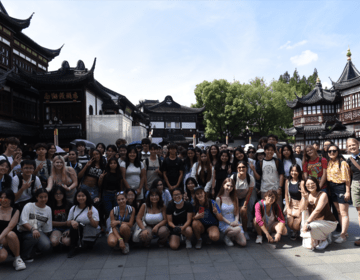June 2018 Guest Blogger: Julia Kempton
My name is Julia (朱丽) Kempton, a rising senior from Stamford, Connecticut. I’m in Nanjing (Session 1), studying Mandarin Language and Chinese Culture. Before I came to China, I remember being very curious as to what I’d be doing day to day on this program; here’s how an average day has gone for me this summer in Nanjing.
I woke up and had breakfast (早饭是酸奶和水果) around 7:30, and left the house at 8. I take the metro (地铁) to school, and arrived in time to get coffee (我们 喜欢喝热奶咖啡)with my friends before class. I’m Level One, which means my class is students who had never studied Mandarin before they came here. After three hours of Mandarin lessons, including breaks to buy snacks at the Happy Lady’s Bodega ( 冰淇淋每天), it was noon. For lunch, my friends and I will go out for noodles, fried rice, or other 中国菜. It’s always surprisingly inexpensive, with a large bowl of 非常好吃 noodles costing just 10 元. After we eat, we usually ping-pong in the student lounge in the international building of 南京大学, which is where classes are held. At 2:00, we have an activity, such as calligraphy, a tour of a historic landmark, or a lecture (我们的老师惊人) about the history of China. Today was something new: kickboxing. It was difficult, but a really fun way to bond with my classmates after our month together. After activity, which usually lasts around ninety minutes, there is “Into the Community” for an hour. Today, this meant the Level One class toured a hospital to practice our vocabulary for the day (看病和医院). Some friends and I stayed in the neighborhood after school to hang out. Then I took the 地铁 back to my host family’s house, getting home around 5:45. When I got home, my host mom was making dinner. We had whole 鱼, 芋头 porridge, 豆腐, and green beans. During dinner, we talked about how our days went. Although I did not know a word of Mandarin when I came here, I’m able to now hold a basic conversation predominantly in Mandarin. My host mom and teenage sister speak English well, so we communicate mostly in “Chinglish”. Whenever possible, I speak in Mandarin, and they correct my grammar and fill in my vocabulary. Living with a host family has enabled me to understand people here even better, because I’m literally living like a local person. They’ve also been there to make sure I don’t feel homesick or struggle in class.
晚饭后, I did my homework, which generally consists of some dialogues to learn and worksheets to fill out, and then studied the week’s vocabulary. Today, my host sister invited me to a yoga class after this, so we went for that. Chinese yoga classes might use different terminology, but they’re essentially the same as in America. As my host sister and I exchanged jokes walking home, I realized how much I would miss Nanjing, and the family I’ve gained here. I’ll be back in the US in a few days, but my month in China is not one I will soon forget.
Related Posts
Wuxi (无锡) - Day 2!
Hanfu (汉服) refers to the traditional clothes worn by the Han ethnic people of China. In ancient times, hanfu was distinguished by social status, occupation, and occasions. Those in the... keep reading

Exploring Shanghai - Visiting Yu Garden and Old City God Temple
On July 18, students visited the Yu Garden (豫园)and the Old City God Temple (城隍庙) in downtown Shanghai. During the excursion, students walked with their peers to explore the history... keep reading